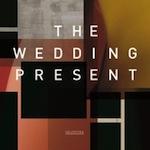
The Wedding Present Valentina
(Scopitones)
It seems impossible to talk about The Wedding Present without quoting John Peel. “The boy Gedge has written some of the best love songs of the rock ‘n’ roll era,” the legendary disc jockey once declared. Valentina, the first Wedding Present album in four years and ninth overall is an affirmation of Peel’s statement, but “the best love songs” is more than just the best being in love songs. Valentina, like the best Wedding Present albums, includes out-of-love songs and songs about questioning having fallen in love, rejecting love, and looking for love.
Indeed, David Gedge, assisted in writing by Graeme Ramsay once again, first declares, “you appall me,” but quickly reneges, “okay, call me.” In a later song he admits that “it’s not that I don’t adore you, because I do/but I’ve realized that I’m never gonna leave my girlfriend for you“ and that “when you entered your number into my phone/I knew right then that I’d never call.” By the end he seems sure that “this couple will never be strolling into a blood red setting sun/While the end credits are rolling.” He finally accepts that “No one could have been more surprised than me/When you wrote your number down/and said call me at the first opportunity/because things like this do not happen to me.” Gedge never quite decides how he feels, or who, if anyone, he loves. So with Valentina, he has created another fine love album, full of clever, relatable, fine love songs, but not in the traditional sense.
There is a some repetition in the songwriting, occasionally too uniform musically to maintain the emotional punch that Gedge's twist on cliché deserves. There are a lot of similarities to 2008’s El Rey, but the sonic appearance is set apart on Valentina by having Andrew Scheps (Iggy Pop, Johnny Cash, Adele) take the place of Steve Albini in the production/mixing role. 524 Fidelio turns the album’s heaviest intro into its most feathery song, complete with airy backing vocals from bassist Pepe le Moko and an elongated vocal delivery by Gedge to tie the album’s most complex and unexpected chorus to the rest of the song. You're Dead and End Credits have some of the most infectious and edgy guitar lines the band has written since 1991’s Seamonsters. The slow, exploratory closer Mystery Date sees Gedge throw away all his wit but none of his word play and singing as emotively as he ever has. He may have lost a bit of power and even a note or two, but the contemplative, two-line guitar riff is moving, progressing perfectly as the rest of the band comes in and the song breaks into an adorable, revelatory romance, complete with strong, versatile songwriting and a frustratingly appropriate ending of le Moko answering Gedge in a foreign language. It’s a case of what you don’t know being as emotionally powerful as what you do know, a sort of Lost In Translation end for an album that is often as confused and lonely-in-love as that film. Thanks to Andrew Scheps, the song reveals its tempo changes and cacophonies at just the right levels, and the result is a song up there with the band’s best.
Maybe too many songs on the album rely on overdriven bass lines and big choruses, but the hooks are solid on their own, and the big bass lines set Valentina apart from earlier material and showcase the band’s growth through the years. When the band does try to mix things up, there is the rare misstep, namely the white noise that ends Back A Bit…Stop! but as a whole the result is more akin to the beautiful harmonium outro of Deer Caught in the Headlights. The pacing is brilliant, with the slower, varied songs coming along right before you might think Gedge and Ramsay are out of tricks. Additionally, great use of overdrive and tone on guitars make even the most familiar passages unabashedly exciting; if Gedge is going to make us shed a tear, he will make sure we’re smiling and dancing when we do. Scheps covers up the familiarity, always emphasizing the strongest components of the song but still letting everything work together, particularly le Moko’s great backing vocals and Gedge’s eternally young stories.
So maybe it’s not their most complex album or their most groundbreaking. But it’s as lyrically wry as the best of them, has at least one contestant for best song and a few for a Best Of. It’s indie-rock, it has punk edge, it’s fun, and while it may be familiar at times, it’s certainly not dry, full of great new riffs and additions. So give it a spin and you might find yourself doing what Gedge can make you do better than anyone since The Smiths called it quits: Laughing and crying at the same time.
20 March, 2012 - 11:01 — Forrest Cardamenis